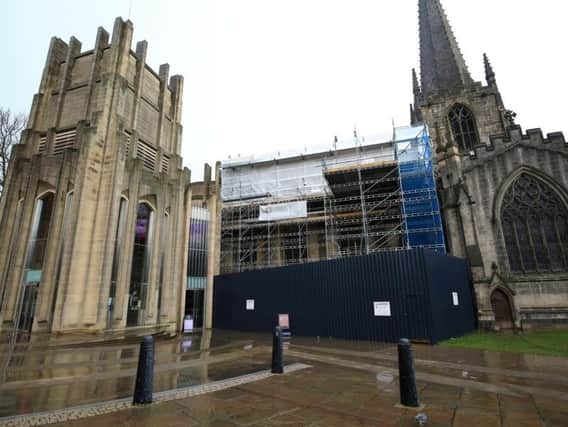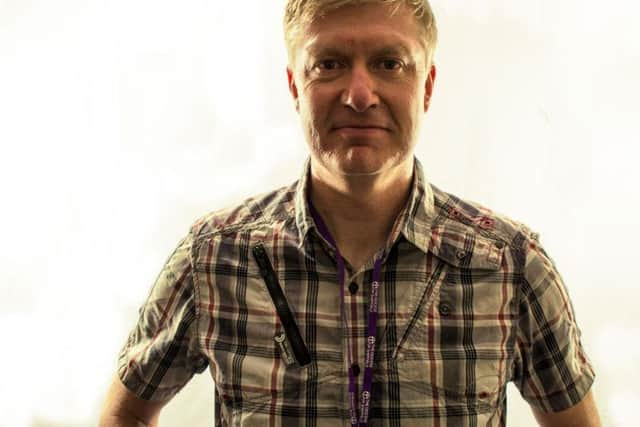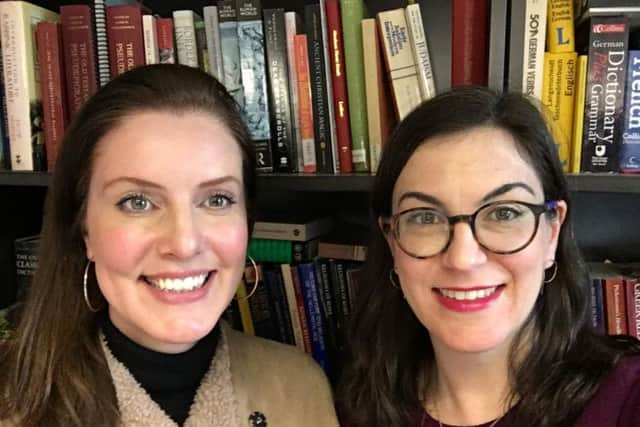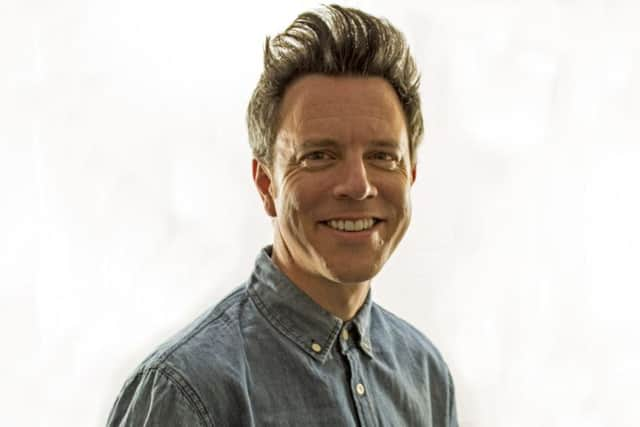SHEFFIELD TELEGRAPH VOICES: What challenges does the church face in modern society?


Joint column by Dr Katie Edwards and Dr Meredith Warren, of the Sheffield Institute for Interdisciplinary Biblical Studies at the University of Sheffield
Over fifty years ago a Time magazine cover asked the question, 'Is God Dead?' The same could be asked in Britain today.
Advertisement
Hide AdAdvertisement
Hide Ad

The Church of England’s lower attendance reflects a conflict of values with its members, especially the under 25s.
Debates around same-sex marriage, abortion and female bishops have split the church and alienated a significant proportion of its congregation.
Throughout ongoing controversies the Church of England has come across as outdated. At the same time, churches are reeling from allegations and legal settlements related to sexual abuse.
As Church of England congregations age and young people reject organised religion, the atrophy of traditional parish churches seems unremitting.
Advertisement
Hide AdAdvertisement
Hide Ad

This is in contrast to more community-oriented Pentecostal churches whose membership is growing.
However, interest in religion itself has increased sharply. Religion is the fastest-growing A-level subject in all of the humanities, social sciences, and arts, increasing a whopping 114 per cent since 2003.
It’s not true that young people are becoming more secular – interest in faith, belief and spirituality is on the increase.
Young people’s 'rejection' of the church could be both a political response to the misogyny and homophobia displayed during church debates over the last few years.
Advertisement
Hide AdAdvertisement
Hide Ad

More people than ever are choosing to learn about religion and what it means for a world that increasingly believes itself to be secular.
This challenges society to reflect on how it defines religious literacy – and that’s a good thing. God, then, isn’t dead. People are just looking for him in a different way.
Mike North, children and young people's adviser to the Diocese of Sheffield
In 2014, the year of Diocese of Sheffield’s centenary, a significant decision was made to use £1 million of reserve funds into a new, 10-year initiative to create a step change in ministry with children, families and young people.
Advertisement
Hide AdAdvertisement
Hide AdThe Centenary Project has grown incrementally with progress that has significantly exceeded our targets.
In the first year the target was to engage with an additional 600 children and young people through the project.
Our data shows that our growing team of workers have engaged with 1, 496 children and young people. The first nine churches with Centenary Project workers have also seen a 28 per cent rise in average weekly attendance in 2015/2016, compared to a diocese-wide growth of one per cent.
Our Centenary Project directly addresses some of the main reasons why many youth or children’s workers' positions have failed in the past.
Advertisement
Hide AdAdvertisement
Hide AdWorkers will leave if they are overworked, or feel under-valued or unappreciated. Paid workers also dropout due to poor line-management, or unrealistic-expectations from clergy, parochial church council members or parents.
The other reason is money. Churches save up enough to appoint someone, but often fail to work out a strategy for raising the funds necessary to continue the post.
The Centenary Project provides achievable objectives for workers and support for clergy.
It provides payroll services, and looks after recruitment.
Workers join a network that prays together, and are trained, supported and mentored.
Advertisement
Hide AdAdvertisement
Hide AdChurches agree to support the ministry and workers by volunteering, praying and raising additional finance to support their worker long-term.
With strategic development funding, the Centenary Project can also expand its work and connect more meaningfully with the work of ‘Make Your City Shine’, based in St Thomas' in Crookes, Sheffield.
This secondary schools-focused ministry has communicated the gospel to thousands of young people in schools across Sheffield and Doncaster over the last five years, and will continue to work with the Centenary Project to provide church, schools and community events, inviting young people to be disciples in their relationships with local churches.
The strategic development funding will also enable us to create a new intern programme, providing a year’s work experience and training for those exploring a calling to youth or children’s ministry within the Centenary Project.
A spokesperson for the Diocese of Sheffield
Advertisement
Hide AdAdvertisement
Hide AdIn some parishes attendance is going up, in others it is falling.
This can be down to excellent local leadership, or a large new housing complex being developed.
That is why the ‘average’ statistics don’t tell the whole story.
Christmas attendance across the Diocese has risen for the last three years.
Advertisement
Hide AdAdvertisement
Hide AdMaking the ‘church’ relevant is important but ultimately it is about bringing people to Jesus Christ.
This can be done in Ponds Forge just as it can in a traditional church building.
We have a number of strands looking at training and leadership of clergy and lay, youth work, church schools, universities, internships, use of church buildings for mission, ongoing ministerial development, safeguarding training, etc.
We don’t just want to boost congregation numbers, but actually lower the average age of church attenders across the diocese.
Advertisement
Hide AdAdvertisement
Hide AdSome parishes find it easier for various reasons:- For example a more engaged local school, ability to employ a youth worker, more appropriate building facilities, more young people in the community to attract, better youth leadership, more engaging activities, better Christian learning courses.
The Centenary Project, launched in 2014, has seen incredible early results, and the new award of £1.84m is recognition of this and builds on it further.
There are churches in every community.
They are well-placed to reach out to children and young people.
Graham Sandersfield, learning development manager at St Peter's College - a community learning hub for the diocese in Sheffield
Advertisement
Hide AdAdvertisement
Hide AdSt Peter’s College is a new kind of learning community for mission and ministry.
Through both face-to-face and online learning, it equips church leaders and others who reach out to serve their local communities.
St Peter’s was launched in 2016. It is a Church of England project for the Diocese of Sheffield, a wide region which includes the Rotherham and Doncaster areas.
We believe St Peter’s is unique - there are other church based digital initiatives elsewhere in this country, but nothing as comprehensive and well developed.
Advertisement
Hide AdAdvertisement
Hide AdHistorically, churches have played a vital role in our nation, enabling worship, education, health, childcare and social justice; there is now just as great a need for churches to be strong and vibrant.
British society is changing rapidly and the church is also changing to address today’s particular challenges.
The Diocese of Sheffield has a vision to resource and release all church members, along with their leaders, to serve God in the heart of their communities in fresh, adventurous and creative ways. St Peter’s enables the learning that is needed to make all this possible.
Recently there has been a big shift in how people are able to learn and want to learn.
Advertisement
Hide AdAdvertisement
Hide AdThe widespread availability of desk-based and mobile devices allows us to respond to these changes with a blended-learning approach.
This combines face-to-face training events with online resources and learning communities.
This way of learning opens up opportunities to grow and develop for those living in more remote locations and those who live increasingly busy lives.
It can also serve the needs of those who would have previously found it difficult to enter any kind of study course.
Advertisement
Hide AdAdvertisement
Hide AdWith this blended-learning approach we have an emphasis on creating communities of practice, sharing experience, resources and connecting those who might otherwise feel isolated.
St Peter’s now has the infrastructure and tools to be able to deliver this new approach to learning. Our resource-driven website and an online virtual learning environment provide an ever growing set of recommended learning resources which can be downloaded and news of upcoming courses and events.
Along with documents, videos and interactive exercises, users can connect with other like-minded learners to share ideas and seek advice through webinars and forums.
The church faces challenges but sees a great calling to re-tool itself to meet the many needs of today’s world. St Peter’s College seeks to inspire and develop everyone in the church to serve God and their community in the best way possible.